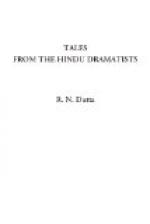The worship of the divinity concluded, the queen worships the king. Sagarika views the scene, mistakes the king for the god and observes, “What do I see? Can this be true? Does then the deity, whose effigy only we adore in the dwelling of my father, here condescend to accept in person the homage of his votaries? I, too, though thus remote, present my humble offering.”
She throws down the flowers and continues:—“Glory to the flower-armed god: may thy auspicious sight both now and hereafter prove not to have been vouchsafed to me in vain!”
She bows down, then rising looks again, and observes:—
“The sight, though oft repeated, never wearies. I must tear myself from this, lest some one should discover me.” She then withdraws a little, hears a bard sing a ballad in praise of the king, perceives her mistake and asks herself, “Is this Udayana, to whom my father destined me a bride?” She becomes enamoured of the king. The king and the queen now rise to return to the palace.
Sagarika thinks, “They come! I must fly hence. Ah me, unhappy! no longer to behold him, whom I could gaze upon for ever.”
The king addresses his queen thus:—“Come, love, thou puttest the night to shame. The beauty of the moon is eclipsed by the loveliness of thy countenance, and the lotus sinks humbled into shade; the sweet songs of thy attendant damsels discredit the murmurs of the bees, and mortified they hasten to hide their disgrace within the flowery blossom.” The king and the queen return to the palace.
Sagarika enters a plantain bower with a brush and pallet in order to paint a picture and soliloquises thus: “Be still, my foolish heart, nor idly throb for one so high above thy hopes. Why thus anxious to behold that form, one only view of which has inspired such painful agitation? Ungrateful, too, as weak, to fly the breast that has been familiar to thee through life, and seek another, and as yet




